As an Amazon Associate, we earn from qualifying purchases with no additional costs for you.
Disposing of kitchen knives is never something that should be done casually. Old or broken kitchen knives can potentially cause injury if not disposed of correctly. We have several proven and safe methods to dispose of kitchen knives that you will find useful when the time comes to get rid of old knives.
Disposing of kitchen knives can be problematic, depending on your local rules. Mostly, waste disposal companies and recycling centers will accept the knives if they are packaged in a manner to safeguard the workers collecting the waste. Some waste centers do not accept knives at all.
Knives disposed of incorrectly can pose a danger to pets, children, or waste management employees who collect and dispose of your waste. Following our proven and safe knife disposal tips will ensure your old knives do not injure or harm anyone accidentally.
If you are interested in checking out the best roll-up knife bag, we recommend trying Dalstrong Nomad Knife Roll. You can find it by clicking here (Amazon link).

What To Do With Old Kitchen Knives
A kitchen knife is a tool, and as with all other tools, they eventually wear out and can no longer perform as well as they used to in the kitchen.
It is important to realize when it is time to dispose of a knife before it becomes dangerous to use in the kitchen, where it could cause injury.
A knife should be disposed of when the following conditions are true.
- The knife handle is damaged. If the knife handle is damaged and cannot be replaced, the knife may be unsafe to use and should be disposed of.
- The blade is damaged. A badly cracked, chipped, or worn blade is an indication that it is time to replace your knife.
- The knife blade is worn. If the knife blade has worn down to the point that it can no longer be sharpened properly, it is time to dispose of the knife.
Other reasons to dispose of a knife may include upgrading to newer, better knives or simply having too many knives and needing to scale down your collection. This can leave you in possession of older or unwanted knives that are still in useable condition.
A knife that doesn’t work well in the kitchen is still a dangerous object and should be disposed of responsibly.
There are a few options for disposing of old kitchen knives. If the knife is still in good condition, you can donate it to a local thrift store or shelter.
If the knife is not in good condition, you can recycle it at a metal recycling center. If you want to dispose of the knife yourself, you can do so by wrapping it in a heavy-duty garbage bag and placing it in the trash.
How To Dispose Of Kitchen Knives (Properly & Safely)
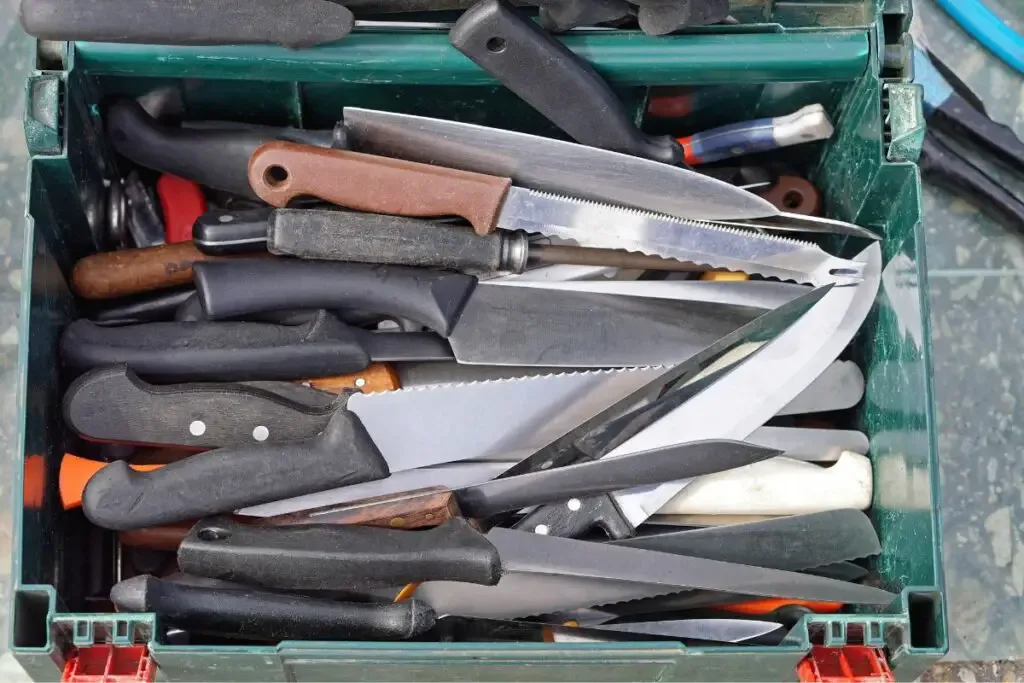
If you’re like most people, you probably have a few kitchen knives that you never use and are just taking up space in your drawer.
Getting rid of them can be tricky, as you don’t want to end up hurting yourself or someone else.
Here are some safe and effective tips for disposing of kitchen knives responsibly.
1. Donate Or Give Away The Old Knife.
If the knife is still in good condition, you could give it to a family member who could use it or consider donating it to a local shelter or food bank. They can put it to good use when preparing food for people in need.
If you no longer need or want the knife and there is no damage to it, giving it away to someone who can use it is a good option. However, you should never donate or give away a damaged knife that could cause injury.
2. Sell Your Old Knives
If your old kitchen knives are still in good or useable condition, you could consider selling your old knives. This option will allow you to get some cash value from your old knives that you can put towards purchasing new, upgraded knives.
Good places to sell your knives are thrift shops, pawn shops, or local online marketplaces on social media platforms.
Once again, selling your old knives is only an option if the knives are still in useable condition and will not pose a danger to the user.
3. Recycle Your Old Kitchen Knives
Recycling is important to preserving natural resources and helping protect our planet, but can you recycle old knives?
The possibility of recycling old kitchen knives will largely depend on the recycling facilities available in your area. In some places, this is a viable option with conditions on how the knives are delivered to the recycling center, but knives are not accepted for recycling in other locations.
We will detail the recycling of kitchen knives, what you need to investigate, and how to recycle the knives in a dedicated section below.
4. Recondition Your Old Kitchen Knives
Some knives, especially larger knives, can be reconditioned or transformed to give new life to the knife.
Custom knife makers may be able to convert a damaged large knife into a smaller knife by removing the damaged sections of the blade and replacing the handle material in the knife.
This method allows you to re-purpose old knives and continue using them in the kitchen, but it may only be a viable option for expensive knives. Reconditioning a cheap knife can be more expensive than buying a new one!
TIP: Professional knife sharpening services are available in most cities and offer to sharpen a wide array of knives and other edged tools. Find out more about the professional sharpening of your old knives in the article below:
Get Your Knives Sharpened Professionally: Why, Costs & How Often
5. Throw Your Old Kitchen Knives In The Trash
The final option for disposing of your old kitchen knives, especially if they are in poor condition, is to throw them in the trash. This option requires that you take special care in disposing of the knives to prevent injury to anyone who will handle the trash.
Disposing of a knife in the trash requires some preparation of the knife for disposal, which we will detail in this article a little later.
If you’re still unsure about disposing of a knife in the trash, your best bet is to contact your local waste management company for guidance. They can help you find the best way to dispose of it safely and responsibly.
Can You Throw Out Kitchen Knives?
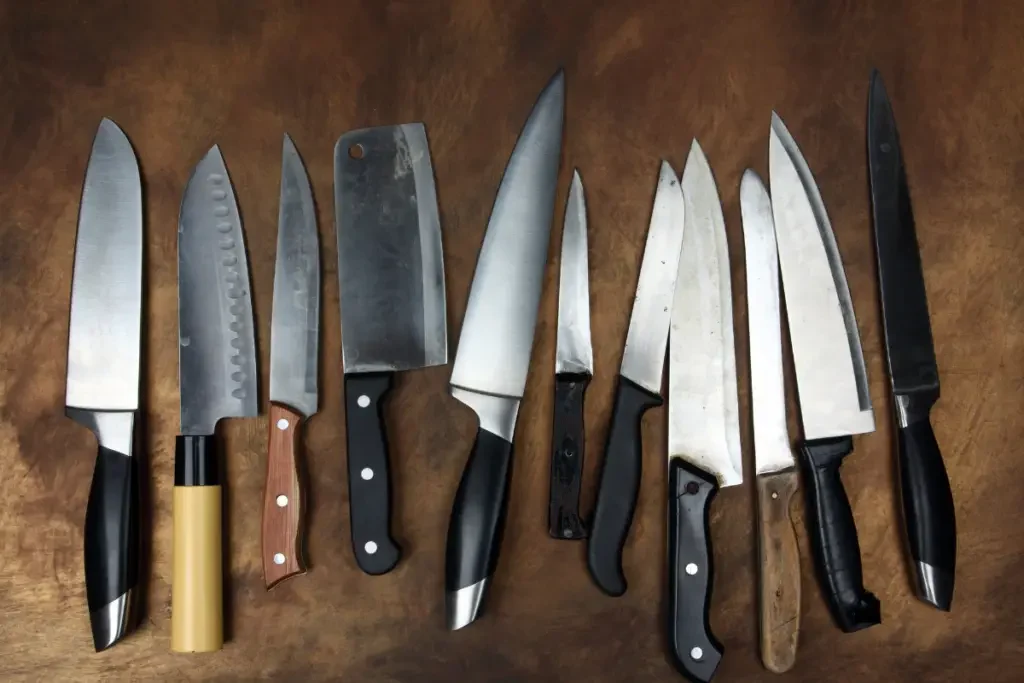
Once you’ve determined that your knives are ready for retirement, it’s time to think about how you’re going to dispose of them.
The safest way to do this is to cover the sharp edge and point of the knife by securely covering the blade in robust materials that can prevent the blade from harming someone. Then, package the knife properly before throwing it in the trash.
We recommend taking the following steps to dispose of a knife in the trash.
- Wrap the blade in the newspaper. Wrap the blade in several layers of newspaper, which will help to prevent the sharp edge from cutting through the rest of the packaging. Fold the end of the newspaper over the knife’s point several times to create a thicker layer of paper, preventing the point from stabbing through the paper. A piece of cork on the knife’s point is also a good means of rendering the knife’s point safe. An old cloth can be used as an alternative to the newspaper.
- Secure the newspaper in place. Secure the newspaper of cloth in place over the knife blade with elastic bands.
- Wrap the entire cardboard. Wrap the entire knife in flexible, durable, corrugated cardboard. You can easily tear up an old cardboard box for this purpose. The cardboard acts as an additional layer of protection should the knife cut or pierce the newspaper.
- Tape up the cardboard. Use packing tape to secure the cardboard around the knife and ensure it will not come loose or that the knife will slip out of the packaging.
- Mark the knife packaging. Write a warning such as “Sharp” or “Knife” on the outside of the package in a permanent marker to warn refuse workers that they are dealing with a sharp object.
- Place the knife in a sturdy container. Finally, place the knife or knives in a sturdy container, such as a stiff cardboard box or an old coffee can, and seal the lid with tape.
- Throw the knife in the trash. With the knife packaged in this way, it can be safely disposed of in your normal trash and will not harm children, pets, or refuse workers.
TIP: Transporting knives requires some planning, which involves the safety of the packer, the transporter, the unpacker, and the knife itself! Find out more about packing kitchen knives in the article below:
Packing Kitchen Knives For Moving (7 Proven & Safe TIPS)
Where Can I Dispose Of My Old Kitchen Knives?
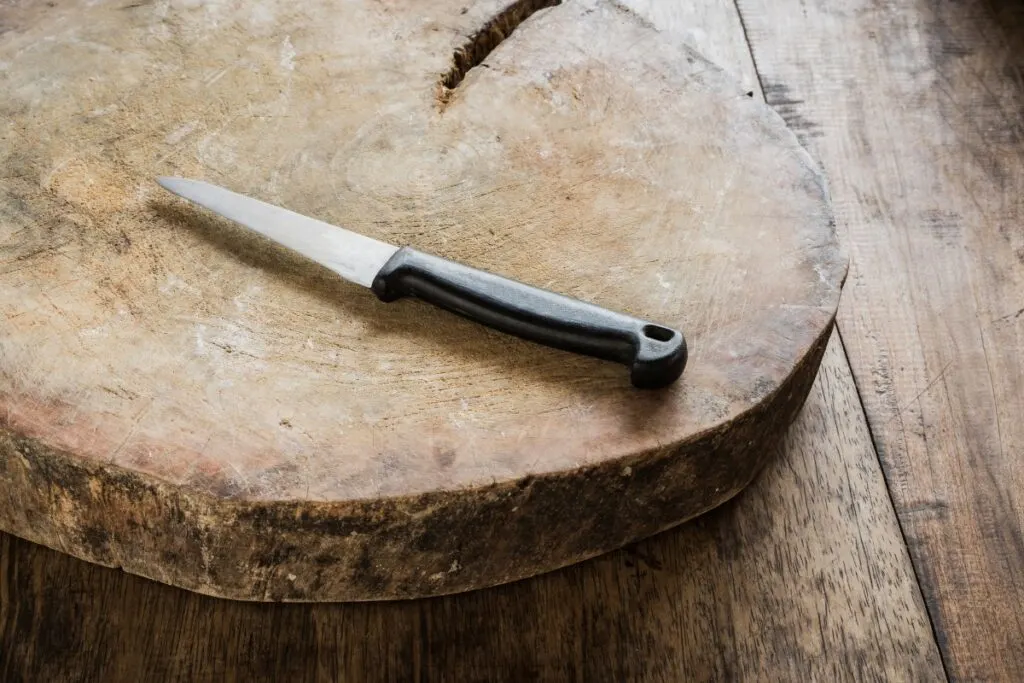
There may sometimes be a dilemma about where to dispose of old kitchen knives. While you may be able to dispose of old kitchen knives in the trash if they are properly packaged for protection, this method is not necessarily allowed in all locations.
What other methods are available to you, and where can you take your old kitchen knives to get rid of them?
If you are not allowed to dispose of knives in your roadside trash collection, you may have to take other measures to get rid of knives that are damaged beyond repair or re-use.
Some waste management centers will accept knives if you deliver the knives to the waste management center yourself rather than placing the knives in the trash for collection.
Other waste management centers have bins outside earmarked for various types of waste, including sharp metal objects. Some centers will also take them from you by hand if you deliver the knives wrapped as previously described to prevent injury.
Not all waste management centers accept knives, whether delivered or collected, so it is important to enquire beforehand by phoning or emailing your local waste collection service before taking your knives to them for disposal.
If your old kitchen knives are still in reasonable, usable condition, you may consider giving them to a local charity or thrift shop.
BTW: If you are interested in buying the best cutting board, you can find our recommendations below:
- The best overall: Virginia Kitchen Boys Cutting Board (Amazon link). This fantastic cutting board is made from sustainable walnut wood from the United States and brings almost perfect safety when cutting with your knives.
- Alternative: Yoshihiro Cutting Board (Amazon link). Professional traditional Japanese cutting board that chefs around the world use.
- Cheaper option: Shun Cultery Cutting Board (Amazon link). Another Japanese cutting board stands out, especially for its simplicity and affordable price.
Do Charity Shops Take Kitchen Knives?
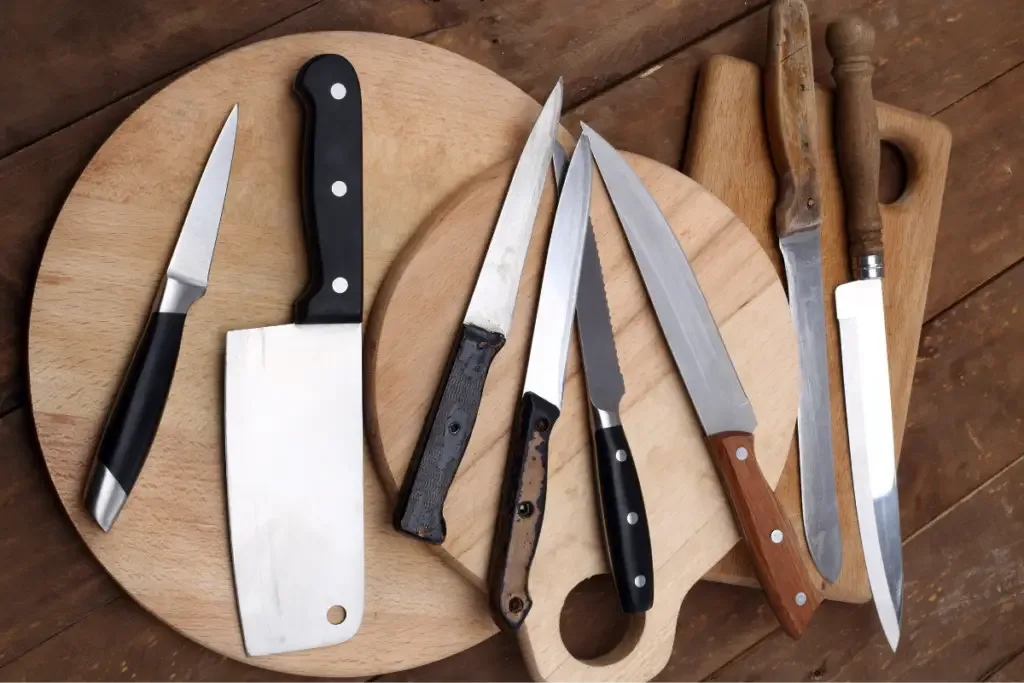
If you have knives still in useable condition, it makes sense to give them to a person, charity, or thrift shop that may be able to use them or sell them to raise money for the charity or organization.
While this is a noble gesture, some charity shops are restricted by what they are allowed to accept for donations for resale to the public.
Before going down to your local charity shop with your unwanted knives, the best strategy is to call ahead and establish their policy regarding accepting kitchen knives.
Some charity shops will accept knives under a certain size and length, while others do not accept knives of any shape or form.
If your charity shop does not accept your old kitchen knives, consider donating your old knives to a local school where the knives can be put to good use in their cooking classes.
TIP: Proper storing and organizing of your knives will keep them in good condition, keep them sharper for longer, and make them ready to use at any time! Find out more in the article below:
Storing & Organizing Kitchen Knives: 5 Proven Tips & Hacks
Can You Recycle Steel Knives?
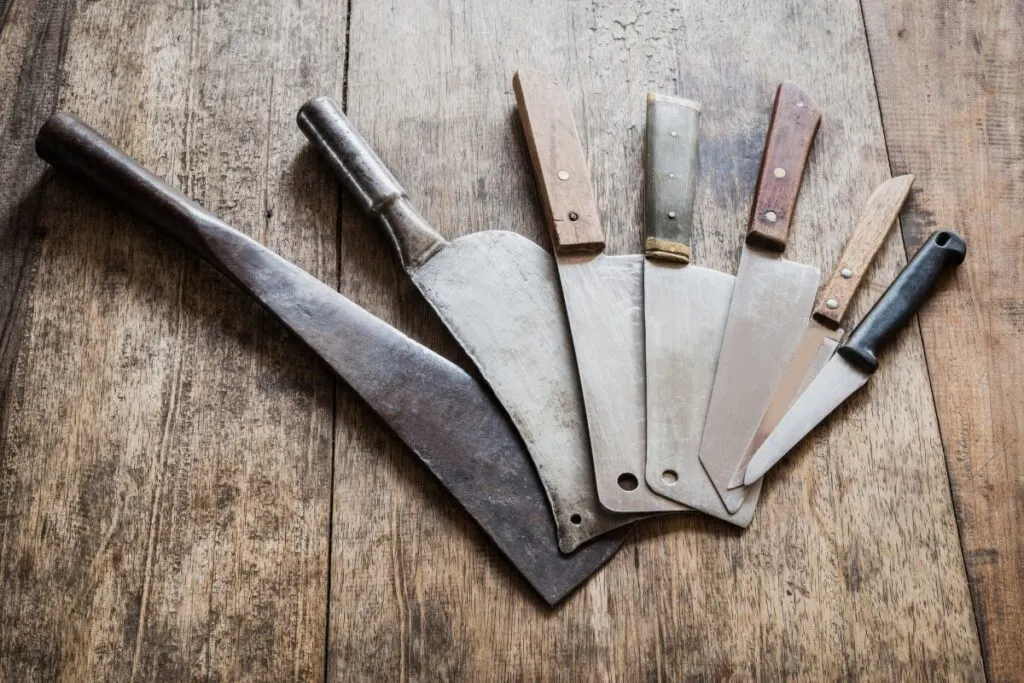
For many people, recycling steel kitchen knives does not come to mind immediately when disposing of old knives.
It is possible to recycle knives in certain instances, but some recycling centers do not have the facility to accept knives.
If your city’s recycling service does not accept kitchen knives, you can always try private recycling companies that may be willing to take the knives off your hands.
One of the best ways to recycle old kitchen knives is to take them down to your local scrap metal dealer. Some scrap metal dealers will even give you a few dollars for your old knives.
Even though it is possible to recycle the steel in the knives, some recycling centers do not accept knives because of the danger involved in sorting and processing them.
TIP: Sharpening your knives is a crucial part of knife maintenance and will affect the usability and longevity of your knives. Check out the comparison of sharpening methods in the article below:
5 Reasons Why Whetstones Are Better Than Any Sharpeners
Do Knives Go in Recycle Bin?
If your recycling center accepts knives, they may or may not accept them in recycling bins. Some recycling centers have the means to safely transport sharp objects deposited in the bins, but others do not.
In most cases where knives are accepted in recycling bins, they need to be packaged securely to avoid harm coming to the people who empty the bins on collection day. Always check with your local recycling center to see if they accept knives before placing them in the recycling bin.
Some centers have strict guidelines about what can be recycled, so it’s always best to check first. If your center does accept knives, make sure to recycle them properly.
Knives should all be deposited in the recycle bin designated to receive these items rather than the regular recycling bins.
The best way to secure the knives before dropping them in the recycling is to wrap and secure the blade in the same way that we discussed for disposing of the knives in the trash.
FAQs For Disposing Of Kitchen Knives
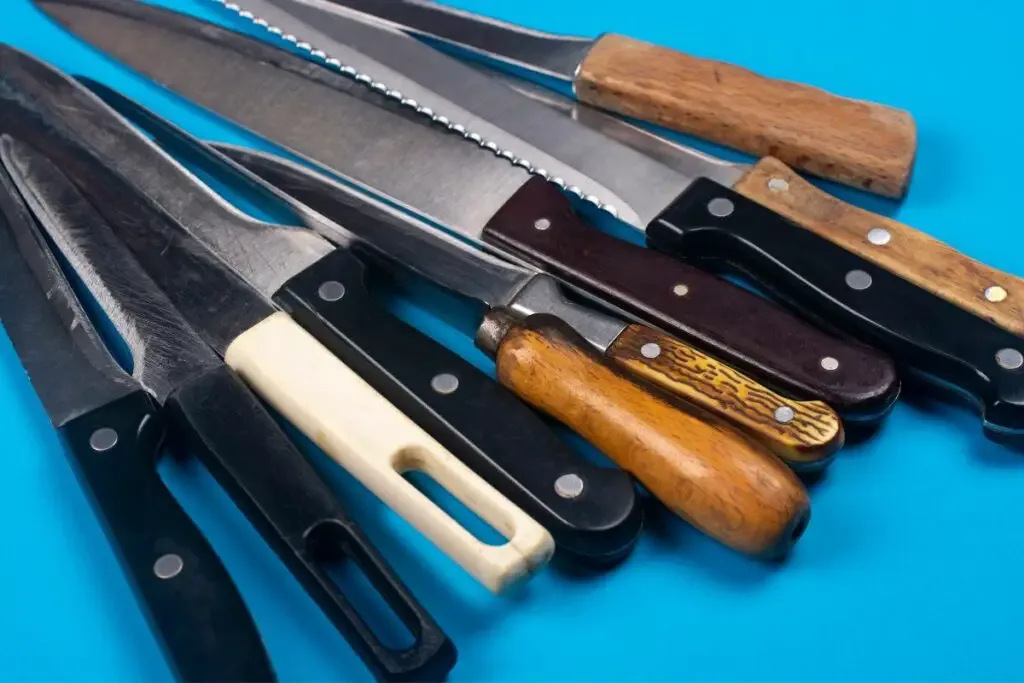
Q: Can I simply throw my old kitchen knives in the trash?
A: While it’s possible to dispose of kitchen knives in the trash, it’s crucial to do so safely. Wrap the blade securely in newspaper or cloth, use a sturdy cardboard for additional protection, and clearly mark the package as containing sharp objects. This ensures the safety of waste management workers and prevents accidents.
Q: Are kitchen knives recyclable, and how do I recycle them?
A: Yes, kitchen knives are often recyclable as they are made of steel. However, not all recycling centers accept them due to safety concerns. Contact your local recycling facility to confirm their policy. If accepted, ensure the knives are securely wrapped to prevent injury during the recycling process.
Q: What should I do with kitchen knives that are still in good condition?
A: If your knives are still usable, consider donating them to local shelters, thrift stores, or culinary schools. Selling them online or at pawn shops is also an option. Remember, donating or selling damaged knives is not advisable for safety reasons.
Q: How can I ensure safe transportation of knives for disposal or donation?
A: When transporting knives, wrap the blade securely and place the knife in a rigid container. If you’re donating, inform the recipient about the knife’s condition and ensure they handle it carefully.
Q: Can damaged kitchen knives be repaired or repurposed?
A: Some damaged knives, especially higher-quality ones, can be repaired or repurposed. Consult with a professional knife sharpener or custom knife maker for options like reconditioning the blade or replacing the handle.
Q: Are there any legal considerations when disposing of kitchen knives?
A: Legal considerations mainly involve safety during disposal. However, it’s wise to check local regulations regarding the disposal of sharp objects to ensure compliance with any specific laws or guidelines.
Q: How do I package a knife for disposal in a recycling bin?
A: If your local recycling center accepts knives, wrap the knife blade in several layers of newspaper or cloth, secure it with tape, and then place it in a sturdy box or container. Mark the package clearly to indicate it contains a sharp object.
Q: What are eco-friendly ways to dispose of old kitchen knives?
A: Eco-friendly disposal methods include recycling the metal at a scrap yard or repurposing the knife for another use. Donating to someone who can use it also reduces waste.
Q: How often should I replace my kitchen knives?
A: The frequency of replacing kitchen knives depends on their quality, usage, and maintenance. Regular sharpening and proper care can extend their lifespan, but if a knife becomes damaged or excessively dull, it may be time for a replacement.
Q: Can I dispose of ceramic knives in the same way as steel knives?
A: Ceramic knives require different disposal methods due to their brittle nature. They are not typically recyclable like steel knives. Wrap them securely and dispose of them in the trash, or contact your local waste management for specific guidance.
Conclusion
Knives may not be the easiest kitchen utensils to dispose of, but many suitable options exist. Unfortunately, the same rules do not apply in every location for the correct way to dispose of kitchen knives.
The best solution is to contact your local waste management company to establish local rules for safely disposing of your old knives. Once you have removed the old knives from your kitchen, you can look forward to the exciting task of buying a new set of upgraded knives!
TIP: Choosing the right knives will give you the best use of the knives and the best value for the price. Check out the complete guide on choosing the best kitchen knives for you in the article below:
Buyer’s Guide: How To Choose The Best Kitchen Knife For You
